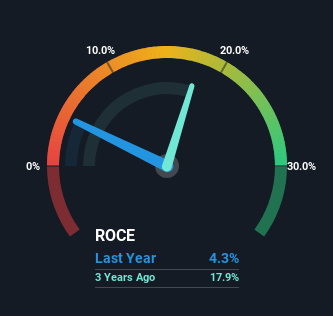- South Korea
- /
- Chemicals
- /
- KOSDAQ:A265740
Some Investors May Be Worried About NFC's (KOSDAQ:265740) Returns On Capital
If you're not sure where to start when looking for the next multi-bagger, there are a few key trends you should keep an eye out for. In a perfect world, we'd like to see a company investing more capital into its business and ideally the returns earned from that capital are also increasing. If you see this, it typically means it's a company with a great business model and plenty of profitable reinvestment opportunities. Although, when we looked at NFC (KOSDAQ:265740), it didn't seem to tick all of these boxes.
What Is Return On Capital Employed (ROCE)?
Just to clarify if you're unsure, ROCE is a metric for evaluating how much pre-tax income (in percentage terms) a company earns on the capital invested in its business. To calculate this metric for NFC, this is the formula:
Return on Capital Employed = Earnings Before Interest and Tax (EBIT) ÷ (Total Assets - Current Liabilities)
0.043 = ₩2.5b ÷ (₩73b - ₩15b) (Based on the trailing twelve months to March 2023).
So, NFC has an ROCE of 4.3%. In absolute terms, that's a low return and it also under-performs the Chemicals industry average of 6.6%.
See our latest analysis for NFC

Historical performance is a great place to start when researching a stock so above you can see the gauge for NFC's ROCE against it's prior returns. If you'd like to look at how NFC has performed in the past in other metrics, you can view this free graph of NFC's past earnings, revenue and cash flow.
What Can We Tell From NFC's ROCE Trend?
When we looked at the ROCE trend at NFC, we didn't gain much confidence. To be more specific, ROCE has fallen from 16% over the last five years. On the other hand, the company has been employing more capital without a corresponding improvement in sales in the last year, which could suggest these investments are longer term plays. It may take some time before the company starts to see any change in earnings from these investments.
What We Can Learn From NFC's ROCE
Bringing it all together, while we're somewhat encouraged by NFC's reinvestment in its own business, we're aware that returns are shrinking. Since the stock has declined 42% over the last three years, investors may not be too optimistic on this trend improving either. All in all, the inherent trends aren't typical of multi-baggers, so if that's what you're after, we think you might have more luck elsewhere.
Since virtually every company faces some risks, it's worth knowing what they are, and we've spotted 4 warning signs for NFC (of which 2 are potentially serious!) that you should know about.
If you want to search for solid companies with great earnings, check out this free list of companies with good balance sheets and impressive returns on equity.
Valuation is complex, but we're here to simplify it.
Discover if NFC might be undervalued or overvalued with our detailed analysis, featuring fair value estimates, potential risks, dividends, insider trades, and its financial condition.
Access Free AnalysisHave feedback on this article? Concerned about the content? Get in touch with us directly. Alternatively, email editorial-team (at) simplywallst.com.
This article by Simply Wall St is general in nature. We provide commentary based on historical data and analyst forecasts only using an unbiased methodology and our articles are not intended to be financial advice. It does not constitute a recommendation to buy or sell any stock, and does not take account of your objectives, or your financial situation. We aim to bring you long-term focused analysis driven by fundamental data. Note that our analysis may not factor in the latest price-sensitive company announcements or qualitative material. Simply Wall St has no position in any stocks mentioned.
About KOSDAQ:A265740
Low risk with weak fundamentals.
Market Insights
Community Narratives




